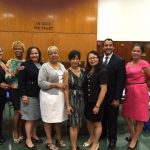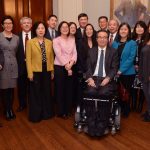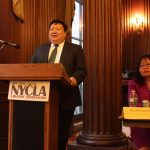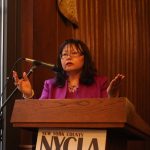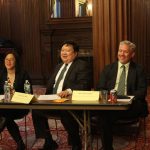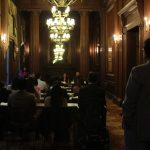In an effort to increase diversity in the judiciary, the Franklin H. Williams Judicial Commission implemented a Judicial Mentor Program. The program provides mentors for attorneys interested in becoming judges through the appointment or electoral process. Click the link in the title to learn more.
NAPABA Applauds the Nomination of James C. Ho to the U.S. Court of Appeals for the Fifth Circuit
WASHINGTON — Today, President Trump nominated James C. Ho to the United States Court of Appeals for the Fifth Circuit. If confirmed, Ho would be the first Asian Pacific American to serve on the U.S. Court of Appeals for the Fifth Circuit, and would be the sixth active Asian Pacific American federal appellate judge in the nation.
“Jim is one of the foremost appellate litigators in the nation and we strongly support and applaud his nomination to serve on the U.S. Court of Appeals for the Fifth Circuit,” said Cyndie M. Chang, president of the National Asian Pacific American Bar Association (NAPABA). “Jim has been a leader in NAPABA for close to a decade. He is widely respected throughout the NAPABA membership and he is consulted by both sides of the aisle.”
NAPABA recommended Ho to Senators John Cornyn and Ted Cruz to serve on the U.S. Court of Appeals for the Fifth Circuit earlier this year.
He is co-chair of the Appellate and Constitutional Law practice group at the law firm of Gibson Dunn & Crutcher. He has presented over 45 oral arguments in federal and state courts nationwide, including 16 arguments before the Fifth Circuit. He has argued and won cases before both the U.S. Supreme Court and the entire Fifth Circuit en banc.
Ho has extensive experience in all three branches of government: as former chief counsel for Senator Cornyn, as an appointee at the U.S. Department of Justice, and as a law clerk for Justice Clarence Thomas of the U.S. Supreme Court and Judge Jerry E. Smith of the U.S. Court of Appeals for the Fifth Circuit. Most recently, he was the first Asian Pacific American ever appointed to serve as the solicitor general of Texas, the state’s chief appellate and Supreme Court litigator, responsible for defending the state’s most important programs and policies against legal attack.
Born in Taiwan, Ho arrived in the U.S. at the age of 1, and became a U.S. citizen at age 9. He is an active member of the Asian Pacific American community. He is co-chair of the NAPABA Judiciary & Executive Nominations & Appointments Committee, and he has written and spoken on a variety of occasions about the role of Asian Pacific Americans in the law. Ho has been recognized for his leadership and honored by organizations throughout the Asian Pacific American community, both nationally and in Texas, including the President’s Award from NAPABA, the Award for Outstanding Contributions to Asian Pacific American Leadership from the Conference on Asian Pacific American Leadership, the Justice David Wellington Chew Award from the Asian Pacific Interest Section of the State Bar of Texas, the Community Leader Award from the Dallas Asian American Bar Association, the Award for Outstanding Contributions in Law from the Greater Dallas Asian American Chamber of Commerce, and the Outstanding Achievement Award from the SMU Asian Pacific American Law Students Association.
Ho has also received numerous other awards and recognitions, including the Medal for Exceptional Civilian Service from the Secretary of Defense. He is a three-time recipient of the Supreme Court Best Brief Award from the National Association of Attorneys General. He has also been named as a leading appellate lawyer by Chambers, Benchmark, Law360, The Best Lawyers in America®, The Legal 500, Texas Super Lawyers, and D Magazine.
NAPABA commends President Trump for nominating Ho to the bench, and thanks Senators Cornyn and Cruz of Texas for recommending him to the White House. NAPABA also urges the Senate to quickly confirm Ho to the bench.
For more information, the media may contact Brett Schuster, NAPABA communications manager, at 202-775-9555 or [email protected].
The National Asian Pacific American Bar Association (NAPABA) is the national association of Asian Pacific American attorneys, judges, law professors, and law students. NAPABA represents the interests of over 50,000 attorneys and over 80 national, state, and local bar associations. Its members include solo practitioners, large firm lawyers, corporate counsel, legal services and non-profit attorneys, and lawyers serving at all levels of government.
NAPABA continues to be a leader in addressing civil rights issues confronting Asian Pacific American communities. Through its national network of committees and affiliates, NAPABA provides a strong voice for increased diversity of the federal and state judiciaries, advocates for equal opportunity in the workplace, works to eliminate hate crimes and anti-immigrant sentiment, and promotes the professional development of people of color in the legal profession.
To learn more about NAPABA, visit www.napaba.org, like us on Facebook, and follow us on Twitter (@NAPABA).
New York County Lawyers Association Statement on Recent Remarks by President Donald J. Trump about Federal Judiciary
On January 27, 2017, President Donald J. Trump issued an Executive Order, which among other things, bars individuals from seven named countries with significant Muslim populations from entering the United States. Over the past week, President Trump has made statements to the effect that the courts, in exercise of their duties and obligations under Article III of the U.S. Constitution, are interfering with national security while a challenge to his Executive Order is sub judice. The President has further stated that the judges hearing his challenges to his Executive Order are influenced by ‘politics’ or ‘political views’ and that recent proceedings on the issue and that recent proceedings on the issue before the U.S. Ninth Circuit Court of Appeals were ‘disgraceful.’ In addition, the President referred to one judge, the Honorable James Robart, a United States District Court Judge in the Western District of Washington, as a ‘so-called’ judge. These statements are ill-considered, are without any evidentiary support, and are destructive of our society and system of law.
For the full text of the statement, click on the link in the title.
PRESS RELEASE – TASK FORCE ON THE JUDICIARY
PRBA TASK FORCE ON THE JUDICIARY
A CALL FOR ACTION
New York, New York – The Puerto Rican Bar Association has organized a Task Force on the Judiciary to examine the lack of representation of Puerto Ricans and Latinos on the bench. The PRBA Calls For Action to ensure that there is TRUE Diversity and Inclusion in the Judiciary and the Judicial Selection Process in New York State.
The Puerto Rican Bar Association – Task Force on the Judiciary – will examine, inspect and evaluate the lack of Puerto Ricans and Latinos on the bench in New York State. We are outraged that for the past two (2) years there have not been any candidates of Puerto Rican and/or Latino background that have come out of the Judicial Committees from the Manhattan, Kings, Queens and Staten Island. Puerto Ricans and Latinos are not fairly represented in the New York Judiciary despite the large population of Puerto Rican and Latino communities in Queens, Manhattan and Brooklyn.
The PRBA will hold public hearings to address the underrepresentation of Puerto Ricans and Hispanics on the bench. Where necessary the PRBA will have monitors to review the process and request that the appropriate government agencies including the United States Department of Justice and the Equal Employment Opportunity Commission review the disparity in the Judicial Selection process to determine if violations of Constitutional rights have resulted. The PRBA has fought difficult battles to ensure that there is diversity on the bench yet it appears that the need for “Diversity and Inclusion” is not being honored. The process needs to be examined and evaluated due to the disparate impact that has resulted.
The Puerto Rican Bar Association also joins with all of the organizations who expressed their profound outrage to the failure of the New York County Democratic Committee Independent Judicial Screening Panel to approve Judge Doris Ling-Cohan for the New York Supreme Court. Judge Ling-Cohan, the first Asian American Female Judge in New York and a longtime PRBA member. The Puerto Rican Bar Association was founded in 1957 and is one of the oldest minority bar associations in New York. We will continue to endeavor to ensure that Puerto Ricans, and all Latinos, are adequately represented in the legal profession so that the Puerto Rican and Latino Communities will continue to have a voice regarding New York State laws and policies.
Press Release from the Office of the District Court Executive
FOR IMMEDIATE RELEASE
December 28, 2015
CONTACT
Eugene J. Corcoran, (718) 613-2260
Chief Judge Carol Bagley Amon is pleased to announce the investiture of Peggy Kuo as United States Magistrate Judge for the Eastern District of New York. Judge Kuo will be sworn in at the Theodore Roosevelt Courthouse in Brooklyn on Tuesday, January 5, 2016 at 5:00 P.M.
Judge Kuo is the first Taiwanese-American federal judge in New York. Before her appointment, Judge Kuo was the Deputy Commissioner and General Counsel of the New York City Office of Administrative Trials and Hearings, the largest municipal tribunal in the country. Previously, she was Chief Hearing Officer at the New York Stock Exchange, where she was in charge of disciplinary matters involving violations of federal securities laws. She was also litigation counsel at WilmerHale, LLP.
From 1998 to 2002, Judge Kuo prosecuted war crimes at the UN International Criminal Tribunal for the former Yugoslavia in The Hague. Her historic trial regarding mass rape in Bosnia later became the topic of the documentary film “I Came To Testify.”
After clerking for the Honorable Judith W. Rogers, then Chief Judge of the D.C. Court of Appeals, Judge Kuo worked as a federal prosecutor, first as an Assistant US Attorney in the District of Columbia, prosecuting general crimes. She then became a trial attorney and Acting Deputy Chief of the Civil Rights Division Criminal Section at the US Department of Justice, where she investigated and prosecuted hate crimes and allegations of police misconduct.
Judge Kuo was born in Taiwan and moved to the United States at the age of three. She graduated from Yale University and Harvard Law School.
東區聯邦法院 再添華裔女法官 – 世界新聞網
Once again, congratulations to Magistrate Judge Peggy Kuo, who was sworn in on October 9, 2015. Her appointment was featured in World Journal, a prominent Chinese language newspaper. To read a translation of the article, “EDNY Adds Another Asian Female Judge,” which mentions AABANY President William Wang, read below. To read the article, click on the link in the title.
Thank you to AABANY Member Lucia Yang for the translation.
Peggy Kuo was appointed to be the third Asian American judge in the United States District Court, Eastern District Court of New York. Kuo graduated from Harvard Law School, used to work as the Deputy Director of the Office of Administrative Trials and Hearings of New York City and the Chief Hearing Officer of NYSE.
Peggy Kuo, 51, graduated from Yale University and Harvard Law School. She used to clerk for Judge Judith Rogers at the District of Columbia Court of Appeals, worked as the Assistant U.S. Attorney of the District of Columbia and the Acting Deputy Chief of U.S. Department of Justice, Civil Rights Division. In addition, she worked as a prosecutor at the United Nations International Criminal Tribunal in the Hague from 1998 to 2002, where she was in charge of investigating and prosecuting the war criminals in former Yugoslavia and crimes against humanity.
Kuo served as the Chief Hearing Officer at the NYSE for six years since 2005, and then served as the Deputy Director and General Counsel of the Office of Administrative Trials and Hearings of New York City since February, 2011. Kuo’s appointment to be the Magistrate Judge of the Eastern District Court of New York was approved on July 21, 2015. She was sworn in recently. Meanwhile, Kuo is a member of the Asian American Bar Association of New York and served as the vice president of Manhattan Legal Services and on the board of the Federal Bar Council.
Kuo’s parents immigrated to the U.S. from Taiwan when she was three and hence she can speak fluent Taiwanese. Her father works as civil engineer in New York, while her mother takes care of the family. Kuo is second of four sisters in her family, all her sisters become doctors or lawyers. Kuo said that she never thought about becoming a law enforcer when she was a child, “because at that time, there was basically no female judges or district attorneys.” But after graduating from law school, she decided to give it a try and now has become one of the few Asian American judges in federal courts.
The Asian American Bar Association of New York applauded her appointment and congratulated on her selection. President William Wang pointed out that Kuo’s appointment represented an increasing number of Asian American judges in federal courts, and reflected the efforts of federal courts to appoint judges from diverse background. Wang also stated that the number of Asian American judges in all levels of U.S. courts is disproportionate with the number Asian American members in the community. AABANY will make continuous efforts to have more qualified Asians serve in the judicial branch.
Peggy Kuo’s appointment made her the third Asian American judge in Eastern District of New York. The other two are Judge Pamela Chen and Magistrate Judge Marilyn D. Go. All of the three judges are female.
PRESS RELEASE: NAPABA Celebrates Historic Milestone with Chuang Confirmation to the Federal District Court for Maryland
FOR IMMEDIATE RELEASE
May 1, 2014
Contact: Emily Chatterjee
(202) 775-9555
NAPABA CELEBRATES HISTORIC MILESTONE WITH CHUANG CONFIRMATION TO THE FEDERAL DISTRICT COURT FOR MARYLAND
WASHINGTON — Today, with the confirmation of Theodore Chuang to the U.S. District Court for the District of Maryland, the Obama Administration has tripled the number of Asian Pacific American judges on the federal bench, going from 8 judges to 24 active Article III APA judges since 2008. Judge Chuang is the first Asian Pacific American judge to serve on the federal judiciary in Maryland or in any of the states in the U.S. Court of Appeals for the Fourth Circuit.
“Theodore Chuang’s confirmation to the U.S. District Court for the District of Maryland is a historic occasion on many fronts,” said William J. Simonitsch, president of the National Asian Pacific American Bar Association (NAPABA). “Judge Chuang has a long history of public service and will be the first Asian Pacific American federal judge to ever sit on the bench in Maryland, breaking yet another barrier in the legal profession. He has long been an active member of NAPABA and the Asian Pacific American community, and we are proud to have supported his nomination. We applaud Senators Barbara Mikulski and Ben Cardin of Maryland for putting Judge Chuang’s name forward.”
“Judge Chuang’s confirmation today also sets a new high for the number of Asian Pacific Americans to serve on the federal bench, and is a fantastic way to begin Asian Pacific American Heritage Month,” added Simonitsch. “President Obama and his administration have demonstrated unwavering support and dedication to the appointment of well-qualified, diverse nominees to the bench, making genuine progress in building a judiciary that looks like our great nation. We also thank all of the U.S. Senators who have supported diverse candidates like Judge Chuang to the bench, and look forward to working with the Senate to do even better in years to come.”
Before his service on the bench, Judge Chuang served as Deputy General Counsel of the U.S. Department of Homeland Security, where he worked since 2009. He was previously the Chief Investigative Counsel for the House Committee on Energy and Commerce in 2009 and Deputy Chief Investigative Counsel for the House Committee on Oversight and Government Reform from 2007 to 2009. Prior to that, Chuang served as an Assistant U.S. Attorney in the District of Massachusetts and as a trial attorney in the Civil Rights Division of the U.S. Department of Justice. Mr. Chuang has held leadership positions with the Asian Pacific American Legal Resource Center, the District of Columbia Bar, and the Asian Pacific American Bar Association of the Greater Washington D.C. Area.
###
The National Asian Pacific American Bar Association (NAPABA) is the national association of Asian Pacific American attorneys, judges, law professors, and law students. NAPABA represents the interests of over 40,000 attorneys and 68 state and local Asian Pacific American bar associations. Its members include solo practitioners, large firm lawyers, corporate counsel, legal service and non-profit attorneys, and lawyers serving at all levels of government. NAPABA continues to be a leader in addressing civil rights issues confronting Asian Pacific American communities. Through its national network of committees and affiliates, NAPABA provides a strong voice for increased diversity of the federal and state judiciaries, advocates for equal opportunity in the workplace, works to eliminate hate crimes and anti-immigrant sentiment, and promotes the professional development of people of color in the legal profession.


